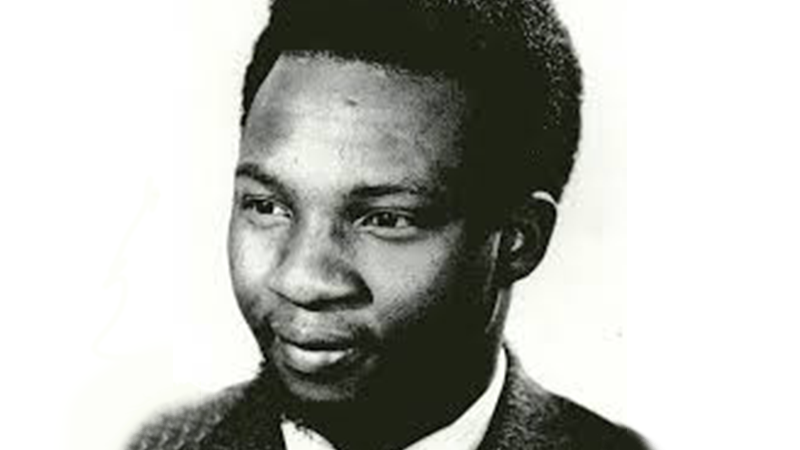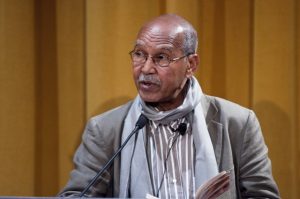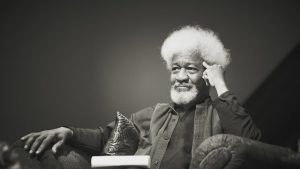Born in Kouroussa, Guinea, on January 1, 1928, Camara Laye is among the pioneering authors from Africa. His writings are well known for their thorough investigation of African history, culture, and identity. Laye’s work is evidence of the depth of African oral traditions, family life, and the change from infancy to maturity within an African civilization. Though comparatively short, his literary career had a long-lasting effect on African literature and established him as a major postcolonial African literary movement figure.
Early Life and Education
Born from a family steeped in the Malinke ethnic group, Camara Laye’s perspective and works were much affected by this background. His mother was well-known for her strong spiritual convictions; his father was a goldsmith, a trade valued in Malinke society. Growing up in this setting, Laye was fully engaged in his people’s spiritual and cultural rituals, which would later become major subjects in his writings.
Laye first studied in Guinea before traveling to Conakry, the capital, to enroll in technical school. Eventually his scholastic path brought him to Paris, France, where he studied engineering. Inspired by a strong feeling of nostalgia for his own country and a need to protect the cultural legacy of his people, Laye started writing while in France.
Literary Career and Best Work
Often regarded as his greatest and most significant work, The African Child (L’Enfant noir) published in 1953 was Camara Laye’s first literary publication. It is a semi-autobiographical book Originally winning the Prix Charles Veillon, the book presents readers with a close-up view of life in a traditional African civilization based on Laye’s early years in Guinea.
Celebrating African culture, customs, and values, The African Child is From Laye’s early years—from his youth in the town of Kouroussa to his adolescence in Conakry and final departure for France—the book is arranged around the phases of Laye’s life. Laye vividly describes the rituals, practices, and beliefs that influenced his childhood, therefore giving life to them.
The way The African Child shows Laye’s connection with his family—especially his relationship with his mother—is among the most arresting features of the work. Laye’s mother is shown as a strong, loving woman whose family’s existence depends much on her spiritual beliefs and link to the supernatural. As Laye struggles with his father’s expectations and his own ambitions, the book explores the complexity of the father-son connection as well.
Laye deftly combines personal story with the collective events of his society in The African Child. Capturing the difficulties and pleasures of growing up in a fast changing environment, the book offers not just a narrative of Laye’s upbringing but also a picture of the larger African experience. The book is a timeless work of art as its ideas of identity, tradition, and the conflict between modernism and legacy appeal to readers from all backgrounds.

Contribution to African Culture and Literature
In terms of his literary production as well as the cultural subjects he supported, Camara Laye’s contributions to African literature and culture are notable Among the first in African literature to provide a real depiction of African life from an African viewpoint, Laye’s writings Laye’s works provided a counter-narrative honoring African identity and history at a period when African civilizations were often seen through the prism of colonialism.
By means of his works, Laye aimed to preserve his people’s traditional customs. As a tool for cultural preservation and transmission, he thought narrative was quite important. Laye made sure that these cultural components would not be lost to future generations by recording the customs, beliefs, and values of the Malinke people. His focus on the need of family, community, and spirituality in African life helped readers to better grasp African culture.
Another important contribution Laye makes to African literature is his investigation of the conflict between modernism and tradition. Laye considers in The African Child the difficulties in balancing contemporary life’s pressures with conventional ideals. In postcolonial African nations, where the pressures of globalization and Westernization often conflict with local customs, this subject is especially pertinent. Laye’s subtle handling of this conflict has inspired next generations of African authors who still struggle with related concerns in their works.
Apart from The African Child, Laye also produced other noteworthy pieces including A Dream of Africa (Dramouss, 1966) and The Radiance of the King (Le Regard du roi, 1954). Examining issues of exile, identity, and the quest for meaning, The Radiance of the King is an allegorical book The bizarre and symbolic storytelling approach of the book is often likened to that of Franz Kafka. Conversely, A Dream of Africa captures Laye’s hope for a more fair and equal society as well as his disappointment with the political events in post-independence Guinea.
Global Impact and Legacy
Not only have Camara Laye’s writings influenced African literature, but international literature as well. Beyond the African continent, his capacity to portray the richness of African culture and the complexities of African identity has won him respect. Laye’s books have been translated into many languages and taught in literary classes all around, hence his voice is naturally included in the global literary canon.
Later African authors who have elaborated on Laye’s ideas of cultural preservation and the conflict between tradition and modernism may clearly see his impact. Writers like Mariama Bâ, Chinua Achebe, and Ngugi wa Thiong’o have praised Laye for opening the path for African writing to be considered seriously on a worldwide scene. His dedication to faithfully and dignifiedly depicting African life has established a benchmark for African writing that still inspires authors now.
Beyond his creative successes, Laye is also revered for his part in Africa’s postcolonial postcolonial cultural rebirth. His writings helped Africans to recover their traditional stories from colonial control, therefore fostering a rising feeling of pride in African identity and legacy. Laye was a major contributor to this cultural rebirth that set the stage for the development of a unique African literary legacy now flourishing.
Conclusion
The life and work of Camara Laye provide witness to the ability of writing to preserve and convey culture. By means of his works, Laye challenged the preconceptions and misunderstandings that had long dominated Western views of Africa, therefore providing the world with a personal window into African life. As African nations negotiate the complexity of postcolonial life, his investigation of ideas like identity, tradition, and modernism is pertinent today.
Laye makes very significant and long-lasting contributions to African literature and culture. His writings have not only enhanced the scene of literature but also been rather important in forming African cultural awareness. Camara Laye’s legacy inspires and influences authors and readers all around, thereby guaranteeing that the tales of Africa be heard, understood, and valued for next generations as one of the first voices of African literature.
Please read all our stories on African Literature here




